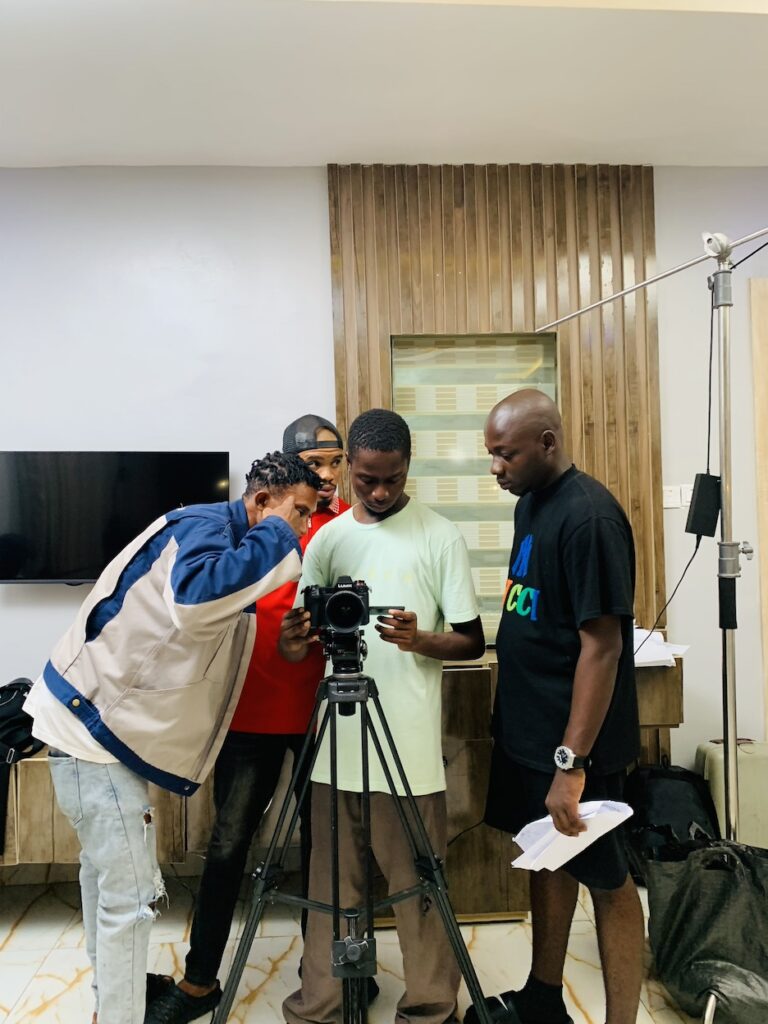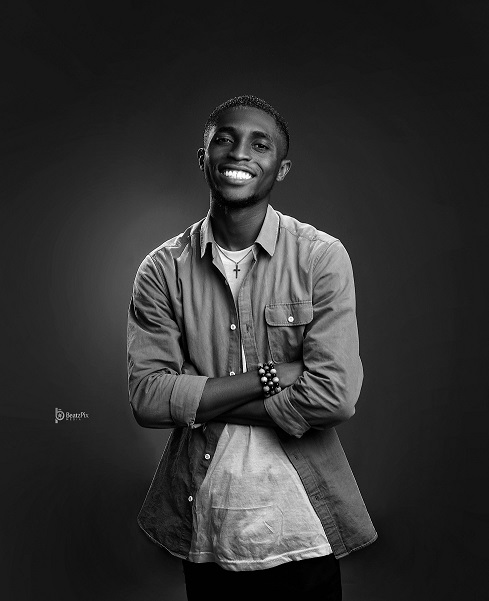Godwin Harrison, an Efik prince, was living in Calabar when he was outed in 2017, turning his private life into public business. He turned to filmmaking to push back against the demonisation of LGBTQ+ people in Nigeria. When time came to launch his own production company, HUG Media Concept, the 30-year-old — who counts among his inspirations Quentin Tarantino’s unconventional storytelling and Tyler Perry’s self-made success — chose to prioritize social justice.
With eight queer-themed films in just five years, his self-funded, advocacy-driven filmmaking is defying Nigeria’s socio-political and economic landscape and stigma. One film, Happy Ending, sheds light on male rape. Another, Amita, celebrates trans people. In Orgasm, a supposed one-night-stand between two persons blossoms into a love story they are not ready for. Free Love is about a man’s complicated journey into polyamory. Pained, a documentary, focuses on the struggles of people living with HIV in Nigeria. In The Hotel, the titular hotel is haunted. Broken Rainbow won best international short film at Queer International Film Festival Africa and best foreign actor at the Reelasia Film Festival in the Philippines. His latest and eighth feature, Ima’mi, is the story of a gay Efik prince, Henshaw, who is entangled in love and duty. It is a fictionalization of his own experience.
“Advocacy is the heartbeat of everything we do,” he said about HUG Media Concept. “It’s not just about making films; it’s about using cinema as a platform to address issues that need visibility, conversation, and change. Every story we tell is chosen to amplify voices that have been silenced or overlooked. Knowing the impact of these stories motivates us to keep going. Advocacy defines our purpose and reminds the world that storytelling can be more than entertainment; it can be activism.”
The great challenge of putting the projects together is the pervasive stigmatization of queerness in Nigeria, which impacted the search for actors. “Many seasoned actors shy away from such roles due to fear of backlash or being typecast,” he said, “so we’re left with limited options and often have to work with those who are willing, even if they lack experience.” It is a central problem for queer filmmakers, including Country Love director Wapah Ezeigwe.
The biggest obstacle, though, is funding.
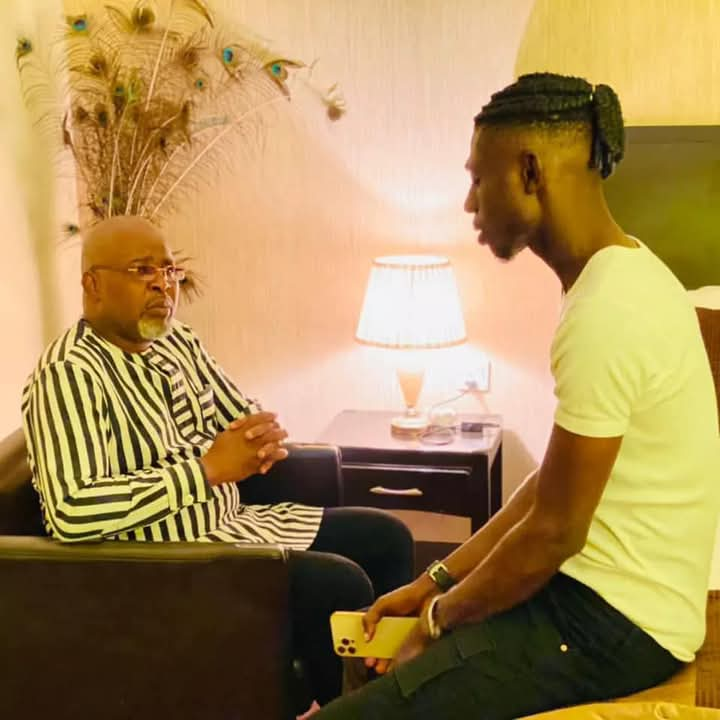
Congratulations on Ima’mi! It is about a prince who falls in love with a palace guard while coming to terms with his royal duties. In the film’s earliest slide, a title card informs us that the story is based on real life. Can you share what drew you to tell this story, and why now? Has there been a queer prince in Efik Kingdom who had Henshaw’s experience?
Thank you so much for the congratulations! Ima’mi is a project very close to my heart. It is based on my true life story, reflecting my personal experience as a prince in Calabar and my struggle when I was outed in 2017. I wrote the screenplay in 2021 and my team and I started saving for the budget.
What actually inspired me to tell this story was the intersection of identity and duty. The crown prince, Henshaw, is not just navigating his queerness in a conservative royal setting; he is also grappling with the immense expectations of tradition. This duality is something that many queer Africans relate to — balancing personal truth with societal expectation.
I chose to tell this story now because we’re in a pivotal moment for queer representation in African cinema. With increasing global conversation around diversity and inclusion, it feels like the right time to push boundaries and reclaim narratives that have been silenced for so long. Through Ima’mi, I aim to spark dialogue, celebrate Efik culture, and humanize queer stories within a distinctly African context.
Ultimately, while the story blends history, oral tradition, and my truth, it also has elements of fiction. It’s rooted in the emotional truths of identity, love, and resilience, which I hope will resonate with audiences everywhere.
What challenges did you face in showing queer love in a culturally sensitive manner?
That was one of the most delicate aspects of creating Ima’mi. As a filmmaker, I understood that I wasn’t just telling a story — I was navigating the deeply rooted traditions, beliefs, and values of a society that often struggles to accept queerness. The challenge was ensuring that the portrayal of Henshaw’s love story felt authentic and respectful to Efik culture while remaining true to the lived experiences of queer people. I spent a lot of time researching Efik traditions, consulting with cultural and legal experts, and listening to personal stories from members of the queer community. All of that helped me create a balance between celebrating the beauty of the culture and addressing the complexities of queerness within it.
Another challenge was self-censorship. I constantly questioned myself: Am I saying too much? Too little? In a society where discussing queerness is still considered taboo, every creative decision carried the potential of backlash. But I reminded myself that this story wasn’t about sensationalism; it was about humanity, love, and resilience.
Perhaps the most emotional challenge was ensuring that the characters weren’t reduced to stereotypes. Queer love is often misunderstood or misrepresented, and I felt a deep responsibility to honor the tenderness and vulnerability that exists within it.
Ultimately, what guided me was empathy — for those who are still forced to hide their truth, for those who have faced rejection, and for those who have never seen themselves represented on screen. I wanted Ima’mi to not only spark conversations but to also offer a sense of belonging and validation to those who see themselves in Henshaw’s story.
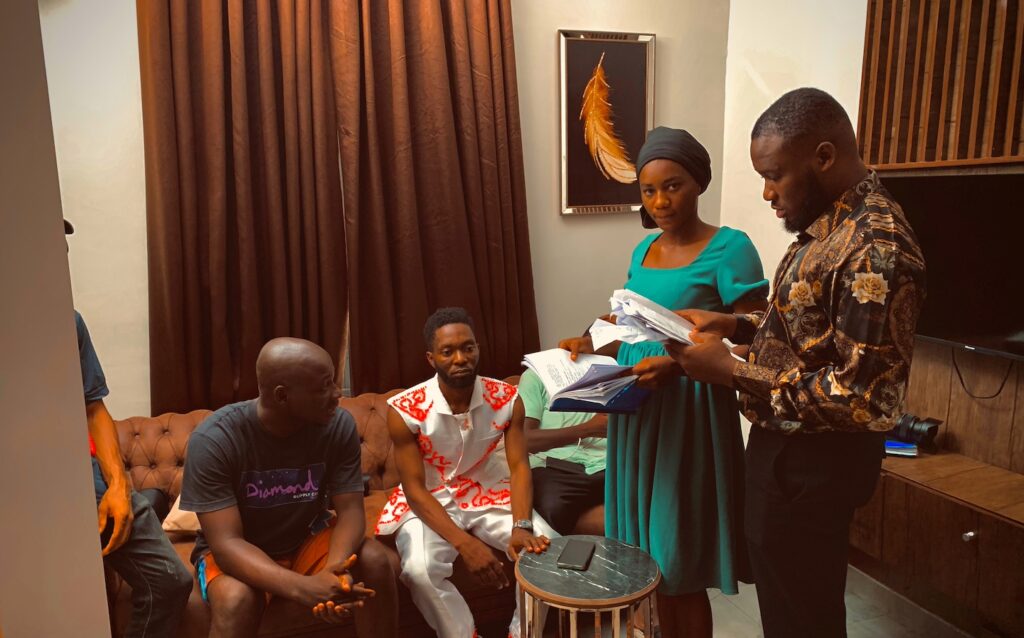
It’s a small production, and with actors relatively new to the craft. How did you navigate these limitations as the director?
You’re absolutely right — working with some of the actors was challenging, especially since many of them were inexperienced. It’s a reality we face often when telling queer stories, particularly in a place like Nigeria where there’s so much stigma. Many seasoned actors shy away from such roles due to fear of backlash or being typecast, so we’re left with limited options and often have to work with those who are willing, even if they lack experience.
As a director, I knew this wasn’t just about making a film: it was about creating a safe space where these actors felt supported and understood. I spent a lot of time working closely with them, breaking down the script, discussing their characters, and helping them connect emotionally to the story. I also encouraged open dialogue on set, allowing them to express their concerns and ask questions without judgment.
We also used improvisation techniques to bring authenticity to their performances. For many of them, it wasn’t just about learning lines; it was about finding the courage to step into roles that challenge societal norms and personal comfort zones.
While their lack of experience was sometimes evident, their commitment to the project was what mattered most. They believed in the story and its importance, and that passion ultimately shone through. For me, it was less about perfection and more about heart, and every single one of them brought that to Ima’mi.
Telling queer stories means that we often have to work with what we have, but it also means creating opportunities for new talent to grow and for these stories to be told, no matter the obstacles.
Are there plans for international distribution, festival submissions, or targeted outreach to LGBTQ+ audiences? Your earlier film Broken Rainbow had some success on those fronts in 2021, winning best international short film at Queer International Film Festival Africa and best foreign actor at the Reelasia Film Festival in the Philippines.
Absolutely. We have plans for Ima’mi. We’re looking to submit to renowned LGBTQ+ festivals such as Frameline, Outfest, and MIX Copenhagen, as well as culturally inclusive festivals like Sundance and Berlinale. These platforms not only provide visibility but also foster conversations around the importance of queer representation in African cinema.
One of our goals is to reach audiences who resonate deeply with the themes of identity, love, and cultural heritage, particularly within the global LGBTQ+ community. We’re working on targeted campaigns to connect with LGBTQ+ communities through advocacy groups, queer-focused media, and social platforms. This is not just about sharing a film; it’s about amplifying voices.
Finally, we’re also exploring streaming platforms to ensure Ima’mi reaches those who may not have access to film festivals but are eager to see stories that reflect their experiences. Our journey with Ima’mi is just beginning, and we’re excited to take it to the world, building on the legacy of Broken Rainbow and continuing to create space for queer African stories to thrive.
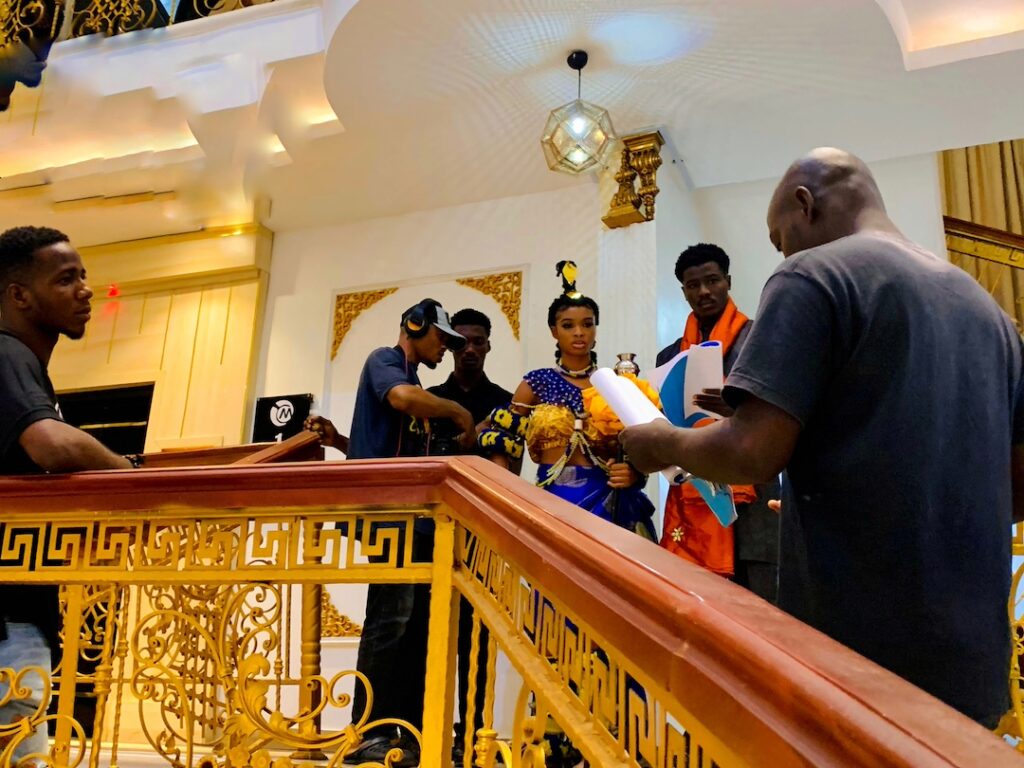
How has HUG Media Concept been able to pull off all of this in such a short time – in the last five years?
It’s been a challenging yet rewarding journey, especially given the socio-political climate in Nigeria and the stigma attached to queer themes. My team and I work with six things in mind:
Passion for advocacy. We are deeply committed to telling underrepresented stories, particularly those of sexual minorities. This passion drives me to push boundaries and create art that challenges the status quo.
Efficient planning. We have streamlined production processes to make the most of limited resources. From pre- to post-production, every step is meticulously planned to avoid waste and maximize impact.
Collaborative efforts. I’ve surrounded myself with a team of talented, like-minded individuals who share the same vision. This includes crew members like Kelvin Okoroji, my creative head, and Uche Ebenezer, my production head.
Self-funding and resourcefulness. Given the lack of external support due to draconian laws, we’ve always had to self-fund our projects. While this has led to financial challenges, such as the debts incurred for Ima’mi, it’s also taught us resilience and innovative budgeting.
Stories with purpose. Each film is rooted in advocacy, whether it’s amplifying Efik culture in Ima’mi or addressing sensitive topics like male rape in Happy Ending. Knowing the impact of these stories motivates us to keep going.
Leveraging recognition. Visibility from international screenings at venues like the British Film Institute, and in Germany, Sweden, and South Africa has opened doors for more opportunities and collaborations.
Ultimately, it’s about staying focused on the mission of using cinema as a tool for change and representation, no matter the hurdles.
What is your vision for LGBTQ+ representation in Nigerian media?
My vision is a triumphant revolution in narratives — one where the stories of sexual minorities are not merely tolerated but celebrated. I envision a media landscape where queer individuals are portrayed as complex, empowered, and multifaceted, not reduced to stereotypes or sidelined. Through bold, unapologetic storytelling, we will challenge societal norms and Draconian laws, shining a light on the humanity and beauty within the LGBTQ+ community. By amplifying their voices, I aim to create a future where Nigerian cinema becomes a beacon of hope, inclusivity, and cultural evolution, inspiring change not just in Nigeria but across Africa and the world.
As I always say, until there is proper representation of the queer community on the African big screen, the masses will continue to wallow in the ocean of hate and ignorance. So this is more than representation to me; it is the rewriting of history, a reclamation of dignity, and a celebration of love, resilience, and identity on the grand stage of African storytelling. The first African queer royalty film project! ♦
If you enjoyed what you just read, please consider making a PayPal donation to enable us to publish more like it.
No One Covers Nollywood Like Open Country Mag
— With the S16 Film Festival, an Arthouse Collective Locks Its Focus
— How Tolu Obanro, Nollywood’s Top Composer, Crafts the Sounds of Its Biggest Hits
— The 10 Best Films & TV Series of the Year
— The 10 Best Acting Performances of the Year
— A Tribe Called Judah, Reviewed: A Box Office-Breaking Heist of Authenticity & Heart
— Rita Dominic‘s Visions of Character
— The Epic, Transformative Comeback of Chidi Mokeme
— How Mami Wata Swam to Sundance
— How Dakore Egbuson and Tony Okungbowa Traverse Trauma in YE!
— Writing Omo Ghetto: The Saga, Nollywood’s Highest Grossing Film of All-Time
— How Yahoo+ Captured a Desperate Side of Internet Fraud
— Awaiting Trial: Families of SARS Victims Speak in Devastating Documentary
— Country Love Depicts Tenderness in LGBTQ Lives

